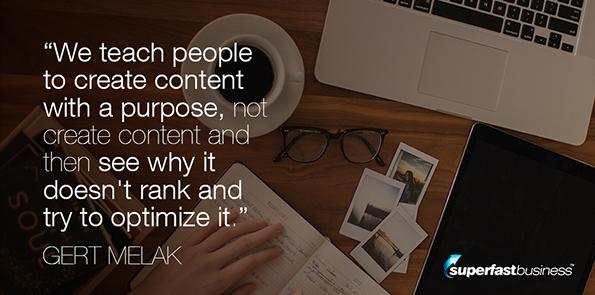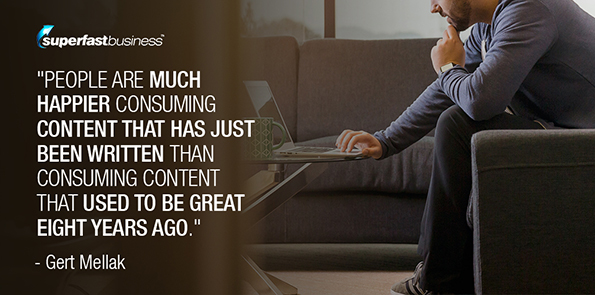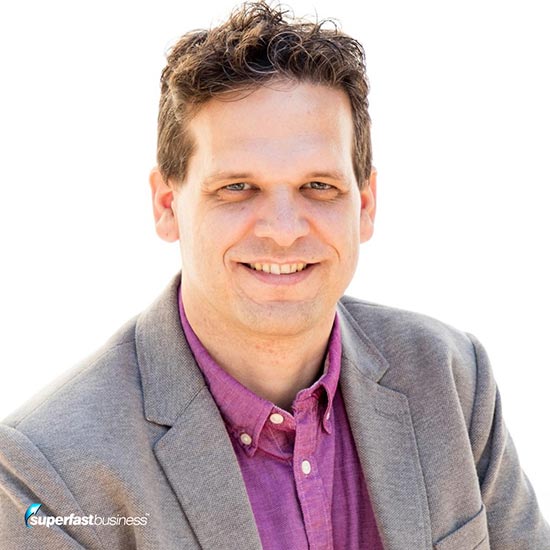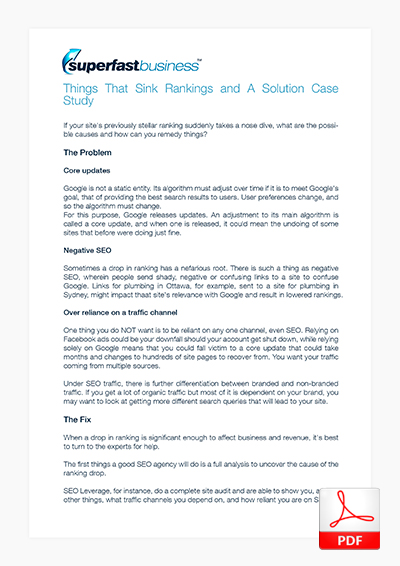When your site's SEO ranking suddenly drops, it can wreak havoc on your company’s online visibility and earnings. Why does it happen, and what can you do?
James Schramko invites his SEO go-to, Gert Mellak of SeoLeverage.com, to shed some light on the possible causes and solutions of just such an occurrence.
Podcast: Download (Duration: 30:02 — 27.6MB)
Get Notified Of Future Episodes Apple Podcasts | Spotify | Amazon Music | Android | Blubrry | Gaana | TuneIn | Deezer | Anghami | RSS | More
Episode highlights:
01:05 – Still a much talked-about topic
02:11 – Social media versus Google
03:39 – SEO at SuperFastBusiness
05:08 – Core updates and user intent
07:33 – A tricky thing to figure out
08:40 – Fixing a 70-percent drop
12:11 – How much traffic comes from where?
13:53 – The negative SEO factor
18:21 – Who’s this ERICA?
22:07 – The SEO Leverage approach
23:59 – How that case study turned out
27:27 – The go-to guy for SEO
Stay strong and visible in your market with help from James
Transcription:
James: James Schramko here. Welcome back to SuperFastBusiness.com. Today we’re talking SEO, which of course stands for search engine optimization. I’ve brought along my friend, Gert Mellak from SeoLeverage.com. Hello, Gert.
Gert: Hi, James, thank you very much for having me here.
James: Always my pleasure.
Still a much talked-about topic
SEO is hotter than ever. I was chatting to my friend Ezra Firestone the other day, who I met about nine years ago in an SEO mastermind, and then he came on to be a student of mine. He built a huge ecommerce store. And I referred him to you, and he’s really enjoying the reports you send across.
But one thing he said to me is, James, can you believe that we are still talking about SEO in 2020 and how hot it is? What’s your thoughts around this, Gert? Because, you know, it surprised me a little bit.
I must admit, when I sold my SEO business three and a half years ago, I thought, you know, maybe social media will get even more powerful. And it is pretty powerful. But SEO has not gone anywhere and Google is more dominant than ever. I’m just wondering, did you always think it would be this strong in 2020?
“So many articles were saying that SEO was dead, even 15 years ago.”
Gert: It’s such a great point. We had a great call yesterday with Ezra about his report. And yeah, SEO is definitely stronger than ever. And it’s so funny. I’ve been doing this for 19 years. We have seen so many fluctuations, so many algorithm updates, etc, and so many articles saying that SEO was dead, even 15 years ago.
Social media versus Google
So there is no SEO, social media is coming, social media is going to take over, everybody’s going to search on Facebook if they need anything, because their friends are going to be able to endorse them, to refer to them, and based on their friends’ preferences, they’re going to get the search results and etc. Nothing of this happened.
And then you’ve got Facebook, and Facebook ads in particular that are getting crazy with vanishing accounts, shutting down accounts for no obvious reason, shutting down campaigns for no obvious reason.
You’ve got COVID, where all the Facebook ads-reliant businesses suddenly completely stopped making money because people were not as fast purchasing via Facebook ads anymore as before, and they suddenly didn’t have any brand exposure.
So people, they suddenly found out that there is an organic channel, they are not present there, and so they had to figure something out. So, to be honest, the whole Facebook ads movement was very good for the SEO industry. SEO is thriving better and more than ever.
And I think that it’s just, the difference is really in the moment where you’re exposed to a brand. So on social media, for example, you’re interrupted, it’s just the way it is – disruptive marketing, they need to catch your attention. But you’re not as inclined to spending a few minutes taking out an offer as you are on search.
“Search marketing and SEO in general is very powerful.”
Because on search, you go to Google, you search for something, you’re prepared to spend a few minutes checking out something, consuming the information. On Facebook, you might be at a bus stop or at a restaurant, waiting around a coffee shop, waiting for your coffee, checking out social media. It’s not the right moment. So search marketing and SEO in general is very powerful.
SEO at SuperFastBusiness
James: Yeah, cool update.
You know, I was checking my analytics the other day. I still get a lot of desktop search, you know, people talking about mobile this, mobile that. And it’s very important, obviously, to optimize for mobile. However, people who are buying my memberships at SuperFastBusiness.com and SuperFastResults.com, a lot of that’s happening on a desktop. And they’re sitting there with buying intent, searching.
And some of the work you and I’ve been doing – we did an earlier episode talking about this as a case study – has really been paying dividends. And one thing is, you tell us what to chase, and that was missing from our repertoire before. You tell us what to get and then we create stuff for it, and we go out and get it.
And we’ve done a couple of new podcast episodes, specifically targeting phrases that we should rank for. And the last time we published it, we were ranking within an hour for the phrase, page one, position one.
It just reminds me of how exciting it was when I started, because I loved SEO when I started. The fact that I could get praise for a job well done from Google was exciting to me. And the fact that I could put in an input and get a specific result was exciting.
But of course, it doesn’t always go according to plan. And you’ve often talked about Google having the core update. So they do these little special campaigns from time to time with imaginative character names. You know, I remember, there was Panda and Penguin and stuff. But they’ve got the core update, which is their main algorithm.
Core updates and user intent
I’d like you to speak to that, and then I’m going to ask you specifically, what happens when you get a savage ranking drop because of a core update? That’s what we’re going to focus on in this particular episode.
Gert: Right. That’s a great point. We’ve just had a core update in May.
So core updates, I usually explain to clients that Google is obviously not static, right? Google needs to be dynamic. Google is dynamic with machine learning. There are no engineers turning screws on a server to bring up different search results. It’s really the algorithm, the machine learning core essentially bringing up search results, deciding what’s relevant.
And what’s relevant also, in a certain moment. You put in “virus” today, and it’s going to bring another result than “virus” a few months ago. Okay? Because we have been through Corona virus, we’re still in it. Depending on the country, you might have more or fewer cases, but the search intent is different.
So the search intent is very important here. It means why someone performs this sort of search in the first place. What Google really wants – and you may have this image of the giant money-making machine that knows everything about us – that might be true. I’m not saying it’s not. But Google at the end of the day got where they are because they make users happy.
 And this is, I think this is also something, I mean, you teach it in business – customer satisfaction throughout the entire customer journey, giving value up front. This is all things I’ve actually learned from you in the last few years. But Google wants to make users happy. So in order to make users happy, you need to correspond with what they are searching for any given moment.
And this is, I think this is also something, I mean, you teach it in business – customer satisfaction throughout the entire customer journey, giving value up front. This is all things I’ve actually learned from you in the last few years. But Google wants to make users happy. So in order to make users happy, you need to correspond with what they are searching for any given moment.
Now over time, users’ expectations change. You mentioned mobile before, for example. We have many sites, not all of them, but many sites getting half of their traffic from mobile phones.
Not necessarily the sales, and it’s interesting you bring that up, because very often we see people doing the research on the mobile phone, sending this to their email, then pulling up on the desktop, looking at it in a quiet moment and then executing the purchase, because it’s just easier to put in your data, you might have them stored to copy and paste or whatever.
But search changes, search behavior changes, and search intent changes. And with that, the expectation of search results change. So where you might have expected to see a site with a big slider image – which was like trending a few years back, you would have a big slider, you would scroll down to consume the content – today, people expect content to be on the top, above the fold, as we call it. Before you start scrolling, you want to get your answer or at least a confirmation that this page is going to answer your question. Okay?
A tricky thing to figure out
So one big thing about core updates we need to take into account is that Google readjust the algorithm to changed user behavior. There is another side of the coin where they now mix all the different updates they had with animal names or any more declarations in the past, they mix them in the core update to make it a little bit more tricky for SEOs to figure out what they are up to.
So you really do need to do your analysis on hundreds of domains after a core update. Like, the entire SEO industry is blowing up after a core update, and they’ll do those every three months approximately, and tons of people researching hundreds and thousands of websites and trying to find patterns around the impact.
In the last one, for example, we saw a very strong pattern about branding. So established brands becoming stronger; sites with a lot of traffic getting even more traffic. And I think this is just a movement from Google towards bigger brands, because it’s a safer bet for them to send someone to a bigger brand than a smaller one, because it’s just more likely that they are going to have a good result there.
James: Right. So unless it’s Hertz, of course
Unless it’s Hertz, yeah. We sometimes get interesting cases after core updates. Right.
Fixing a 70-percent drop
James: So as soon as these core updates happen, you’ve got these tools, and you’re checking sites, and you can see what’s changed. You had a scenario where someone had a massive change. You want to talk about what happened when their site dropped in rankings?
Gert: Absolutely. This was a very impactful case for us for several reasons. But first of all, this is a guy, he’s still a client of ours. And he came in with a 70 percent ranking drop.
And if you’ve got a business that depends solely on organic traffic, there is a very good chance that if you have been running this business for a few years, and you have been creating content that you did very well in the past, and you’ve got more and more content, and more and more traffic, and the more articles you published, the more content you got.
Which is something we see on many sites that have been around for, let’s say, seven, eight years or so at least. Because there was just not the same amount of competition, there was not the same degree of optimization necessary on their site.
But then this client, for example, dropped 70 percent in traffic. And this essentially, if you lose 70 percent of your sales from one day to the other one, just because Google decided to launch an update, it’s not only frustrating, but I think he probably didn’t sleep for five nights in a row, just trying to figure out what has happened.
And this is where, then, we really start with a full analysis, and analyze as many components that might be influential here as possible to get like to a theory of what might have caused the ranking drop. So it was definitely a core update. We knew there was a core update going on, but then you’d really need to decide how this core update affected your particular site.
James: Now, was he a client when this happened? Or was he not a client when this happened?
Gert: He came for advice. So he had this ranking update. He saw his ranking drop, and he didn’t really take SEO seriously before. He was just pushing out content, getting more traffic, pushing out more content, getting more traffic. And this for seven years in a row, I think. So this was the first time he got, like, conscious about his dependence.
And this is where we try to really make sure people know what they depend upon. Once we do a site audit, we show them, Look, these are your traffic channels. You depend on SEO, which isn’t good either. I don’t want any business to depend hundred percent on SEO.
You also don’t want to depend hundred percent on Facebook ads. You want to have a solid foundation, you want to have multiple pillars bringing traffic into your site. If it’s only Facebook ads, your account can get shut down, you’re out of business. There is a virus, there’s a pandemic going on. We know, now, these things can happen, and you need to take this into account.
If you’re solely reliant on Google, updates can happen. You can get back up, but it might take time. And it might mean a few weeks or even sometimes months until you get back and get your revenue back, to figure out what users in Google want now, change hundreds of pages. And this really takes time and takes a lot of revenue.
So he came in, seeking advice, and then wanted to have us close to his business from there, just to avoid this happening again, because there are quite a few things you can do to prevent this.
James: How did he know what happened? And how long did it take him to figure it out?
Gert: I think he figured it out pretty soon. Because if you’ve got such a ranking drop – I think that he dropped 70 percent over two days or three days – you start searching what happened, right? You start searching on Google what happened. Was there a Google update? Was there something changing on Google?
You’ll get, like, if you follow a few pages, so many people running websites follow a few pages or Facebook groups about SEO. And they get, like, the news from probably multiple sites or their web designer, or their programmer or web developer might know something. So he had, like, a notion there was something going on in Google. And we just explained then that this was just, the core update was June last year, that had affected him quite a lot.
How much of your traffic comes from where?
James: So the first thing that we should pay attention to here is, if we have a website, it would be good to know how much of our traffic, and of that traffic, how much of it is buying traffic, already comes from SEO. Would you say that’s something every website owner should know?
Gert: Absolutely. And not only from SEO, but you also want to know your share of branded and non-branded traffic. So I just had a call the other day with a client who gets great organic traffic statistics. A lot of organic traffic. But if you look a little bit closer, it’s only branded traffic. Okay? So there’s non-branded queries.
And what this means is that he has got a strong brand, which is great. But you only can scale the traffic then based on your brand impact you have on this planet, right? If you do a campaign, and your brand gets known in new places, or new countries, etc, you’re getting more traffic. But being over-reliant on only branded traffic, for example, is also critical. So you want to also rely on multiple search queries. You want to have a lot of different search queries ending up bringing users to your website.
James: Nice. I think I remember this guy, because I have a feeling I might have sent him to you. And he came back to me and said, Thank you so much. Like, oh my God, this guy saved me. I want to know what you did.
Gert: Yeah, it was a referral of yours. Correct. It was a referral of yours. We’ve got a great relation with him. Since then, we have been doing tons of more work with him. We got referrals from him as well. We have two more clients referred by him afterwards. We’re doing ERICA consultings right now.
So what we did essentially, what we always do if someone comes and their rankings drop, we need to know what happened. If you have a core update correlating with the time when the ranking drop happens, you can pretty much say it’s the core update that affected them.
The negative SEO factor
But you never know for sure. Because sometimes, there’s also such a thing called negative SEO, which means people send negative links or shady links or confusing links to your site from other places, just to confuse Google and make sure it really doesn’t get the right idea about your site.
So for example, if you have a plumbing business in Sydney, they might send links to you with plumbing Ottawa, for example. You’re not going to sell your services in Ottawa, but they might succeed in confusing Google enough to lower your rankings a little bit, because you might not only be relevant for Sydney anymore. Okay? So things like those happen.
And in this case, this client also had tons of negative links pointing to his site, and starting around the same time of the core update. So we had to do a complete link audit, check out all these links, determine if they had an impact on the ranking drop or not. And only when we could exclude this aspect, we then moved on and did an audit on the entire site.
So we call those deep dive audits, where we essentially do a 360-degree analysis of a website, from technical side to content, site usability, user experience, content structure, everything goes into these deep dive audits. And this then allows us to compare what he has and the way he presents his content to what Google wants to rank now. And this is very important after an update.
So after an update, usually, the first page or first two pages are going to change in terms of rankings. Okay? So whoever does not correspond to what Google thinks users want to see, after the core update, has definitely lost rankings.
But in order to then come back up, you need to check out, what is it that Google wants to see now? Because this changes over time, every core update might shake up especially the page one rankings. Because Google has, like, a new idea. They collect signals all the time, they have a lot of data about us. They know what we want. Do we usually go back to Google and click on another result if we land on the side? etc. So you need to check out, what is it that’s really ranking?
James: So let me get this straight. The core update changed. The results dropped, and when you went in to investigate, you found out he’s got some dirty competitor trying to sink his website with nasty backlinks that he didn’t even know about?
Gert: Right.
James: That’s outrageous.
Gert: Exactly. Most people are not aware of the links they get.
James: I remember someone told me they logged on to the Apple marketplace and they saw that I had some one star reviews for this podcast. Like, I know I’m not great, right? But there was like, dozens and dozens of one star reviews from just, obviously fake names that were put up within days.
Someone out there had invested so much time and energy into making my podcast drop out of the rankings through bad reviews. I’ve very rarely been the target of this sort of stuff, thankfully, in the whole time I’ve been online. I put in a report, and they removed them all and then the rankings went up.
But if you are listening to this podcast, and you do like it and if you haven’t already done it, please go to Apple or wherever you see this podcast, and give it a review. It just reminded me that they are important.
And you know, if you ever do see fishy business for someone else’s website, make sure you tell them, because they probably don’t know, I think this was going for, like, six months before I ever found out about it. No one mentioned it to me. And it just caught me by surprise.
So I would say, if you haven’t already done it, go and do an assessment. I just asked Gert, actually, to go and do a full website audit on another one of my properties. And we found so much low-hanging fruit. Because we’ve never done it. We’ve been busy building it, and we’re in a pretty competitive space. And he came back with a report.
“It’s one thing to have an SEO report, but you’ve actually got to do things and make changes.”
And this is really the important part. Having the report is the first step. And I think you mentioned ERICA before – you sort of slipped that out in casual conversation, Gert. I want you to remind us what it stands for. And then talk about the implementation. Because it’s one thing to have a report, but you’ve actually got to do things and make changes. But they’re not difficult to do in some cases. And you have them in different stages, because there are some things that are really easy, and some things take longer.
And I’m reminded of this, because on my work in progress right now is a specific podcast. It’s coming up soon, it’s a fairly soon episode. And it’s specifically around homework that Gert gave me for a podcast that we need to make, to help our SuperFastBusiness website rank for a particular phrase that’s important to our website, which is identified through research. But we had to go and create something, and then we’re going to publish it. And then we start getting some backlinks. So these are all the steps, but you got to do stuff.
Who’s this ERICA?
So remind us what ERICA stands for, and then what do we have to do once we get the report?
Gert: Right. ERICA is a framework I came up with at some point. Because we have been consulting with clients for years, and I figured out that we essentially always approach the topic from the same angles. Okay? So having you as a business coach for quite a few years, I know you like acronyms, you like frameworks, you like systems. At some point, I just built a system for it. Because always for the team, it’s easier to work through a system, work through a proper structure. Also for clients, it’s easier to understand what’s going to happen in a consulting call.
So we started to structure the consulting calls based on an acronym that’s ERICA. E for evolution, where we check what’s the evolution of the site, what’s the evolution of competitors’ sites, where they are heading, what are their main KPIs we want to watch? What are the competitors’ KPIs?
 R stands for research. SEO is much more research than anybody thinks. People don’t do enough research, and especially, this is especially the point. We want people, or we teach people to create content with a purpose, not create content and then see why it doesn’t rank and try to optimize it. You want to create it with a purpose in mind in the first place.
R stands for research. SEO is much more research than anybody thinks. People don’t do enough research, and especially, this is especially the point. We want people, or we teach people to create content with a purpose, not create content and then see why it doesn’t rank and try to optimize it. You want to create it with a purpose in mind in the first place.
“SEO is much more research than anybody thinks.”
This is where we advise you and say, James, look, I think there is an opportunity. Create a podcast around such and such topic, and then you can earn the fruits. You can see the results very quickly, especially because we very often do content briefs, meaning we give, like, instructions to a writer and say, Look, this is the topic you should write about. This is what Google wants to see. They don’t want to see an 8000-word article, because just because it’s long, it’s not going to rank. They want to see 1500 words and they want to see these topics mentioned.
And then the writer can go and create this article. This is part of the research we do. But research is also competitive research. You always want to know, one of the first things we do with a client, is to figure out where they are in the competitive landscape.
So you might think you don’t have competitors, but you do, because every single blog, every single article out there, every single forum post can essentially be competing for a Google user’s attention. And you want to know where you are in this space. So R is research for ERICA.
“If you have an article, and you don’t place internal links to it, why should Google rank it? Apparently, it’s not even important for yourself.”
I is interlinking, as we call it. It affects internal and external links. So people highly underrate the value of internal linking. Because internal linking is really what makes it clear to Google how important certain pages are on your site. If you have an article, and you don’t place internal links to it, why should Google rank it? Apparently, it’s not even important for yourself. Okay?
Then C stands for content. Obviously, we always want to not only create new content, we always want to update existing content. Because the content we created a year ago might not be relevant anymore. And you can see this with ranking drops or traffic drops.
 If you have content that used to do well and is dropping in traffic, you might want to go in, search for the main key phrases, and compare the results to your piece of content. Things might have changed. Things probably have changed. And also, content freshness is a thing in many industries. So people are much happier consuming content that has just been written than consuming content that used to be great eight years ago.
If you have content that used to do well and is dropping in traffic, you might want to go in, search for the main key phrases, and compare the results to your piece of content. Things might have changed. Things probably have changed. And also, content freshness is a thing in many industries. So people are much happier consuming content that has just been written than consuming content that used to be great eight years ago.
And then the A is really action steps. So every strategy call we do with a client ends up in action steps for him and his team or her and her team. And for my team, and for me, as well. So everybody knows we do these calls every couple of weeks. And everybody knows what’s going to happen in the next couple of weeks.
And then we have a call again, look at what we have been doing, what has been working, what competitors have been doing over time, which links are pointing now to our site, to be aware of those. What are the ranking changes?
Was there a Google update? Is there something – Google just launched a new thing called Web Vitals, where they evaluate user experience in a different way. It’s important to know about these things because you might have a big slider or a big video on your homepage, and it’s not the best thing right now anymore to do, because it affects user experience in a new way.
The SEO Leverage approach
So this is the ERICA framework we put every client through. Usually we start with an audit, just to be able to refix the most essential technical things and get, like, a keyword research done, get a content map where we map out the entire structure, what it should be like so that Google can understand it.
We check out all their URLs they have on the page, because very often, it’s just a tiny fraction of all the articles you have on their website that really drives traffic, And you want to know if you can prune or redirect or do something with the rest of them in order to not have Google waste their crawl budget on any URLs that are never going to rank.
 And then very often remote clients then ask us for online consulting because they see there is a lot of value in having someone around that pokes you with a stick once in a while and says, Look, you should be fixing this.
And then very often remote clients then ask us for online consulting because they see there is a lot of value in having someone around that pokes you with a stick once in a while and says, Look, you should be fixing this.
We do set goals every single week. People have access to their site audit in every single moment, so you can once in a while check this out, or have someone on your team just take this report out that’s being generated every week to see if there are any basics you’re missing, any alternative text on an image, any links that are broken. Imagine if you have broken links, why should Google send you traffic? People are not happy when they click on a link and it’s not available. Okay? So broken links, for example, is something we fix very often.
So we have, like, a structured approach. It usually starts with the audit. And then it’s important to see that if a business relies on a certain percentage on organic traffic, to have someone around that really can help you and guide you, even if your team then does the implementation, but you want someone to guide you on what’s important.
And especially, be informed about what’s going on in the space, because at the end of the day it’s one of the main sales-generating channels probably in your business.
James: I think it’s really obvious that you got no chance of being on top of this and doing it all yourself if you’re busy doing some other part of the business. And that’s what I love about your service, and how we’ve integrated with it.
What’s the website address someone can go to if they listen to this, and they want to get their website checked out?
Gert: The website is SEOLeverage.com.
How that case study turned out
James: So tell me, what did the client do? They’ve started implementing your suggestions. Did the website recover? And how long did it take? What sort of things did they have to do?
Gert: So I really need to credit the client, because I’ve yet to see a client that is able to implement so many things in such a tiny fraction of time. So they spent days and nights, over three weeks, I think, implementing things they should have done in five years before based on our suggestion.
So we figured out links were not the issue. The links are so obviously negative that Google ignores those. So if there’s something completely unrelated, if there are poker links or casino-related links pointing to a business website, it’s probably so unrelated Google ignores those. They are not going to be of any even negative value.
But there were a lot of things the client was breaking on as per our suggestions. One was site speed. So site speed, if your competitors are faster than you on Google, site speed is definitely going to move the needle for you.
He had big slider images. I mentioned initially, big slider images were trendy a few years ago, because it was something new and web designers loved it. Today people love quick information. So we had him remove the slider image.
We had him also change articles. Because sometimes it’s also the article structure and which topics you mention first, which topics you mention afterwards. And he has a very conversational style on the articles, as if he would talk about these topics and he said Look, they can easily explain this to you. I’m going to talk to you about five steps, etc. So sometimes they were like, a hundred, 200 words at the beginning, just introducing the conversation. And people obviously like this style, but Google didn’t anymore at some point.
So we analyzed the situation after the update and saw that most sites get to the point right on top. So we had him remove the introductory part, be less conversational, more down to the facts. If we want to have a certain topic, I want to see right above the fold before crawling, without any sliders, without any introductory fluff, essentially, what the answer is going to be, or if this article at least, is going to give me the answer.
So we did a lot of things there. We did a lot of things with internal linking. And today, up to today, he’s still working on internal linking. Because he had his articles, like, floating in space, on the website, right? They weren’t attached to anything. They were just part of the blog.
And this is something we see in 90 percent of our site audits. People have a content machine created very often, but it’s not taking into account that every article should go somewhere, every article should support or link to other articles in a certain way. So it’s important to map this out and make sure we link articles together.
Because at the end of the day, you can get backlinks to your website, but it’s the internal links that then distribute this page rank link choose power, however you want to call it, that comes in from external within your pages. So if you have a page where it takes five or six clicks to get there, it’s probably not that important. But if you then expect this page to rank well and drive traffic, it’s just not going to happen.
James: And so what happened?
Gert: Three weeks later, he was back up to where he was. So it was three weeks of hard work on both sides. Three weeks later, he was back up to where he was before the core update. And then we started ERICA. And I think ERICA was a little bit of a game-changer for him, because suddenly SEO was the main thing he saw he had to focus on.
And right now, the current status is he is about more than 2X of what he had before the core update in terms of traffic.
James: So he’s doubled the traffic.
Gert: He’s doubled the traffic. He saw the ceiling of traffic he could get with his website was a little bit above what he had before the core update, and we just doubled it. So the ceiling is probably five times of what he had before.
The go-to guy for SEO
James: That’s amazing.
And I want to say thank you to you, Gert, for helping us with our website. That’s why I want to get you on this show, to talk about the work you’re doing. I’ve seen your business expand dramatically. I’ve been behind the scenes helping you out with that business. In full disclosure, I have a pretty good visibility on what you’re doing there, the clients you’re working with, and the results you’re getting.
And you are my rock-solid recommendation. When someone says SEO, before they finish the sentence, I’m like, You got to speak to Gert. He’s the guy over there at SEOLeverage.com.
I want to get you back on a future episode, and I want to talk about link building. Because I think most people think SEO equals link building. And I don’t want to dismiss it and say, well, it’s not all about link building, I want to have a conversation with you about, what is link building? Where do we get them from? What are the differences in the type of links? What are the methods that we should be utilizing? Now, would you be keen to come back and talk about that in the future?
Gert: Yeah, absolutely. I’d love to. And I also want to take up this opportunity and really thank you. You are instrumental in our growth. We have been learning so much, even before joining SilverCircle, from you, from your methods, from your frameworks, and I really want to take this opportunity to thank you.
James: My pleasure. You know, it’s like, I’m just absolutely blown away that there’s so much demand for SEO now. And the good operators, you know, they have to be good. And there’s great things to be gotten from SEO. It’s still amazing. Even in our own websites, a lot of my purchases come from SEO-generated inquiries. And I’ve got you to thank for our improvements in that lately.
So let’s get back on a future episode. For now, if you’re interested in having your website checked out, you can ask Gert to do that over at SEOLeverage.com. And we’re going to catch up with Gert in a future episode.
Thank you so much for listening to SuperFastBusiness. This is Episode 757. Gert packs a lot of information into this conversation. We also put together a handy little condensed guide as a PDF download, you can pop your email address in, get the download, and you’ll be able to go through this episode and really make sure that you get the best results from it. Give it to your team, get an audit, and watch your SEO results improve.
Until next time, I’m James Schramko. This is SuperFastBusiness.com.
Check out our online business coaching options at JamesSchramko(membership).











Leave a Reply